- Home
- Michael Northrop
Polaris
Polaris Read online
CONTENTS
TITLE PAGE
DEDICATION
MAP
PROLOGUE: IT BEGINS
CHAPTER 1: LOCKED IN
CHAPTER 2: A SOUND LIKE THUNDER
CHAPTER 3: TRIAL BY FIRE
CHAPTER 4: ALONE ON THE WAVES
CHAPTER 5: GHOST STORIES
CHAPTER 6: A WORLD DARK AND DANK
CHAPTER 7: THE FIRST STEP
CHAPTER 8: HAULING WIND
CHAPTER 9: A NOISE IN THE DARKNESS
CHAPTER 10: COMING UNWRAPPED
CHAPTER 11: THE WIND AT THEIR BACKS
CHAPTER 12: SPRINGING THE YARD
CHAPTER 13: A NEW ORDER
CHAPTER 14: BETTER ARM OURSELVES
CHAPTER 15: TURNED BACK
CHAPTER 16: THE FACE OF HORROR
CHAPTER 17: NO TURNING BACK
CHAPTER 18: A TURN FOR THE WORSE
CHAPTER 19: A SCIENTIFIC ENQUIRY
CHAPTER 20: A REVELATION FROM THE DEEP
CHAPTER 21: THE MONSTER MUST DIE
CHAPTER 22: THE HUNT
CHAPTER 23: DARK DAYS
CHAPTER 24: UNEASY AT THE WHEEL
CHAPTER 25: DAFFY RAISES THE ALARM
CHAPTER 26: LAND HO!
CHAPTER 27: A VOTE, INTERRUPTED
CHAPTER 28: AS GOOD AS DEAD
CHAPTER 29: LEAVE A STRAIGHT WAKE
CHAPTER 30: A SPORE SUBJECT
CHAPTER 31: TRIAL BY SCIENCE
CHAPTER 32: GIVING UP THE GHOST
CHAPTER 33: SOUND AND FURY
AUTHOR’S NOTE
ABOUT THE AUTHOR
SURROUNDED BY SHARKS PREVIEW
COPYRIGHT
The 1830s, somewhere off the coast of Brazil
The proud sailing ship Polaris bobbed up and down on the waves as it lay at anchor. Just across the surf sprawled the massive, teeming Amazon rain forest. Cabin boy Owen Ward stood at the ship’s rail, peering at the river mouth through a borrowed spyglass. He watched the soft flow of muddy river water emptying into the somber, salty Atlantic.
As a passing swell lifted the ship’s wooden hull, his view shifted. He saw the greens and browns of towering trees and winding vines, and the deep shadows beneath them that hid all manner of unimaginable wildlife. Even a quarter mile out and above the murmur of the surf, he could hear a nonstop chorus of caws and shrieks and chirps emanating from the jungle. What he could neither see nor hear, though, was any sign of the ship’s launch, the long, sturdy rowboat that had ferried the shore party to their mission.
The launch had disappeared up the murky river more than a week earlier, carrying with it the ship’s captain, first mate, doctor, and eight of its best sailors, along with the strange fellow who had necessitated this trip in the first place. Owen tried to remember the word … “botanist”—that was it. A man in the philosophical line who studied flowers and trees and such, if he understood correctly.
Owen lowered the glass, collapsing the two brass tubes into each other and sheathing the device in the one large pocket of his ragged black vest. He wore the vest open, the buttons a distant memory, over a threadbare shirt. His pants were duck canvas trousers worn in the sailor’s fashion: tight around the hips and long and flowing around the ankles. His shoes weren’t there at all.
The Polaris was here on a scientific expedition—“a voyage of discovery,” the captain had called it. Now Owen looked around the deck at the rear end of that voyage. There were a dozen men, not the best of the crew so much as the rest of the crew. Scattered among them were half as many ship’s boys, who worked cheaper, ate less, and took up less space. Owen knew well that a boat without its captain was an empty and idle thing, and when the first mate was gone too …
A few of the men halfheartedly pushed mops around the deck. A few more kept questionable watch up in the rigging with eyes half-closed. Others busied themselves with not being busy. Several sailors lounged openly about the elevated forecastle at the front of the ship, as if passing a lazy Sunday after a week of hard sailing. But there had been no sailing at all this week, only waiting. The lone exception: The third mate had sent a ship’s boy named Manny aloft to apply a protective coating of grease to the mainmast, perhaps hoping to set a good example. It hadn’t worked.
Owen hovered near the back of the ship, away from the rest. He was not quite thirteen years old, though the entry next to his name in the ship’s roll read fifteen. In his defense, the other ship’s boys had all lied about their ages too—it was a proud nautical tradition. And while that ragged lot had the advantage of anonymity, with nothing but their willingness to work hard for a pittance to recommend them for a life at sea, Owen had another time-honored advantage. The captain was his uncle. He was sure the other sailors, the “old salts” and “jack-tars,” distrusted him for it. And maybe disliked him too.
That didn’t matter at all when his uncle was around. But now, with his uncle and his most trusted men ashore, Owen stayed close to the ship’s small quarterdeck. The raised section at the back of the boat was home to the captain’s cabin, the ship’s large wooden-spoked steering wheel, and a short stretch of deck that was the exclusive domain of the officers. Even with the captain and first mate gone, the sailors dared not go there, for fear of having their sunburned hides whipped bloody. Owen himself was not quite standing on it now, though he was the cabin boy and crossed that rarefied stretch of deck often in his line of work.
In fact, there was only one person standing on the quarterdeck at the moment. It was not the gloomy second mate, William Shannahan, who had gone below deck again for some unfathomable reason. It was a boy no older than Owen, who simply knew no better. Henry Neap was the botanist’s assistant, but the captain had deemed him too frail for the inland expedition. Owen glanced over at the boy with open disdain. What he saw was a landlubber of the first order, with not a sailor’s bone in his scrawny body, leaning over the railing like a dog awaiting its master. It did not occur to Owen that he was doing much the same thing, as he once again pulled the spyglass from his vest, unfolded the little telescope, and pressed it to his eye.
This time, at long last, he saw what he was looking for. He lowered the glass and raised his voice. “Boat ho!” he cried in the manliest baritone he could muster.
Atop the mainmast high above him, the lookout climbed to his feet. A moment later, he echoed the call. The launch was returning. Down on the deck, the idlers sprang to their feet, and the second mate bolted out of the aft hatch as if shot from it.
“Give me the glass, boy,” he said, showing Owen his upturned palm.
“There’s something wrong,” said Owen, reluctantly handing it over.
Shannahan took a moment to locate the boat in the narrow eye of the lens. “But where are they?” he mumbled. “Where are the rest?”
Owen squinted into the distance. Even without the glass, he could see the trouble: The little boat was half-empty. Where were the other men?
Owen stared at the approaching boat as it crested a breaking wave. Its occupants were shrunk to doll size by distance and bent double over the oars, pulling hard to escape the surf. He scanned the figures, searching desperately for any sign of the captain. Mercifully, he wasn’t hard to spot. He was the only one not rowing.
But what of the others? What had happened to them?
As if in answer, the piercing shriek of some wild beast carried across the water. It sounded, to Owen’s untrained ear, like wild laughter. And though the day was bright and the sun blistering, a cold shiver shot through him.
In the minutes leading up to the boat’s reappearance, Henry Neap had been leaning uneasily over the rail and peering longingly toward land. He was no sailor. He was a botanist’s assistant, and he was that to the core. He was gazing out at the tall trees rising from the
banks of the river and trying to identify them. His eye went to the tallest one, towering over the shoreline even at this distance, its green halo dotted with pinprick white flowers. A kapok tree, thought Henry, though the scientific name escaped him.
He wished once again that Dr. Wetherby had left his books behind—but much more than that, he wished that the doctor had not left him behind! His head drooped in despair. His eyes slid from the dizzying variety of the jungle’s edge to the ocean below. He watched the water flop and slop against the side of the ship. He could hardly believe that he’d sailed all this way only to be left behind. He could still hear the captain’s words clearly: “Not the boy. Just look at him. These wilds are unexplored, and Lord knows what dangers lurk within, what manner of beasts. This is an expedition for strong men—well, for strong men and you, Doctor.”
In one harangue, Captain Eagling had managed to insult both Henry and his employer. “Just look at him …” Henry stared down at his own soft hands and scrawny arms. As always, it was the truth that stung the most. And now that the expedition was ashore, he knew that he would get no closer to the wild abundance of species that lay just across the water.
Henry looked up again at the treetops swaying lightly in the breeze as if waving him good-bye. So many varieties, one next to the other, but how could he hope to make out the smaller ones at this distance? He glanced over at the cabin boy, who stood a dozen feet away, scanning the shoreline through a spyglass. Henry desperately wanted to borrow it, but he was sure he’d receive nothing more than a punch in the shoulder if he asked. He’d known boys like this one back at school, brawny and athletic. Before Dr. Wetherby had plucked Henry from the head of his class for a life of science, he’d felt the sickening thump of their knuckles driven into his gut many times.
Suddenly, the cabin boy lowered the spyglass and called out, “Boat ho!”
Henry searched the waves, and there it was. The sturdy old rowboat the expedition had taken ashore scaled the face of a breaking wave and then rode swiftly down its back. He scanned the figures, desperate for any sign of the doctor.
He squinted hard, and when that didn’t work, he opened his eyes as wide as they would go. Even at this distance, he could see that there were far fewer men returning than had left. He gave up on the tiny faces and searched for the doctor’s silver hair or brown jacket. Nothing. Where was he? He cast his eyes back toward shore, hoping to see a campfire or a pitched tent. Perhaps they were just returning for more supplies … But there was no sign of the rest of the crew.
A terrible wail carried across the water. Henry’s mind told him it was the call of a howling monkey, an exotic beast with a cry reputed to carry for miles. But his gut insisted it was something worse. He looked at the men in the boat, hunched over and pulling desperately on their oars. He heard the wild cry of the jungle behind them. And in that instant he knew it: The expedition wasn’t resupplying. It was retreating.
With every stroke, the launch grew closer and larger and clearer. He could see the survivors’ torn clothing and dirt-smeared skin. There was no denying it anymore. The doctor was not among them. Henry’s head swam, and he had to grip the rail hard just to stay upright.
Is he gone for good? thought Henry. And am I, once again, alone in this world?
The mainmast was like a tall, skinny tree shooting skyward, sprouting yardarms instead of branches and clothed in sails instead of leaves. Manny Iglesias was halfway up, swaying from side to side as the ship rolled on the waves, with a bucket of stinking grease in one hand and a brush in the other. That left Manny, short for Manuel, exactly zero hands to hold on to anything but hope. Ship’s boys were listed last in the muster book and fed last at mealtime, but theirs were always the first names called for nasty work like greasing the mast. Manny gripped the rope rigging with bare, calloused feet, leaned forward, and said a little prayer. “Padre nuestro, que estás en el cielo …”
The ship rolled, the mast swayed, and Manny applied another brushful of rotting animal fat to the old wood in the hope that it wouldn’t crack in half before the journey was over. The call of “Boat ho!” floated up like a prayer answered.
Manny dropped the brush into the bucket and watched with great interest as the boat approached. A quick count revealed six people, half the number there should have been. A scan of the shore revealed no camp, no one waiting. This was bad.
The second mate reappeared on deck and immediately called, “All hands!” A rush of sailors headed for the rail. Manny hooked the bucket handle under an elbow and scrambled down the horizontal rope ratlines to join them.
The launch covered the distance quickly. “Hoist us aboard, blast you!” called the captain as the boat bobbed perilously close to the heavy wooden sides of the rocking ship. A charge surged through the entire crew at the sound of the captain’s voice. Lines were lowered from the boom, and both men and boat were hauled aboard quickly.
Small and slight, Manny was a better fit for work aloft than for hauling—but then, there wasn’t much to haul this time. Most of the landing party’s equipment and supplies seemed to have been left behind, along with the missing crew.
A thought bubbled to the surface as Manny watched the remaining men scramble over the rail. They left the jungle quickly … chased out. The survivors were good men, mostly, the captain having picked the best of the lot for the trip. Phelan and Jackson had returned, and a handful of others. All of them were filthy, their clothes torn and dirty, their eyes haunted.
The last man to climb aboard was William Wrickitts, and he nearly didn’t make it. He was moving clumsily, like a stunned bumblebee bumping against a windowpane. Attempting to swing his leg over the side of the boat, he clipped his foot on the edge and lost his balance. He reached out for the shoulder of the man in front of him, trying to keep from falling, but his hands failed to grab hold.
He lurched backward and seemed headed for the sea, but the strong hand of the captain grabbed a fistful of Wrickitts’s shirt and hauled him upright. “Get this man some help,” he barked. “He is not well.”
Manny began to count the missing. The ship’s doctor was gone, and the strange scientist who’d traveled with them was gone too. Manny risked a quick glimpse at the man’s ship-bound assistant. The boy’s expression was one of stunned disbelief.
Manny looked away and continued the grim count. The first mate, a good sailor and a decent man, gone. Three more good sailors gone as well. Six lost in all, the party sliced in two.
“But, Captain,” began a sailor named Duffy, “where are the others?”
Duffy was a competent and well-liked seaman, but he was known to be more than a little simpleminded. Jaw clenched, Captain Eagling glared at him but then seemed to remember Duffy’s limitations. “The jungle took them,” he said, shaking his head. “The jungle took them all.”
The words echoed like thunder across the suddenly silent deck. A moment later, the captain broke the spell he’d cast. “You, Boy Obed!” he called, spotting a ship’s boy named Obed Macy. “Secure this trunk deep in the hold.”
A small leather-bound trunk was plucked from the launch and handed to the silent child. Obed was a reclusive boy, small for his age, but strong for his size. The combination doomed him to the grim job of hold rat. As a result, he spent as much time down in the dark, stinking confines of the hold as Manny spent aloft, nestled in the blue skies of the rigging.
Manny slid over a few steps to stand beside Mario, the two touching shoulders lightly. The others called them “the Spanish brothers,” and it was not a term of endearment. They were young, foreign, and orphaned, with only their skills and each other to their name. They were dressed much as the rest of the crew, with loose shirts, pants salvaged from strips of sailcloth, and battered black sun-shielding hats worn on the back of their heads. But unlike the others, the Spanish brothers also wore headscarves and thick undershirts, both tightly bound in what they assured the others was “the Spanish style.” Their olive Iberian complexions had darkened further un
der the relentless sun.
The botanist’s stunned assistant, new to the sea and his own skin still red and peeling, seemed to wake to the real world just long enough to recognize the trunk. “The doctor’s specimen case,” he mumbled, brushing his fingers across it as it passed.
“Yes,” said the captain, the anger draining from his voice. “The jungle took much from us, but we took something back.”
Obed Macy carried the precious cargo to the hold, disappearing down the aft hatch into the darkness below.
It was a darkness from which neither he nor the Polaris would ever truly emerge.
Owen had just helped to round up his fellow ship’s boys and bring them to the captain’s cabin. For his trouble, Captain Eagling shoved him in last. Unprepared for the sharp cuff to the shoulder, Owen stumbled into the low square room, nearly bumping his head on the oil lamp suspended from the ceiling.
“Stay in there until I come get you,” called the captain. “This meeting is no place for children—and we’ve already lost one of you lot.”
Owen straightened up quickly, brushing off his vest and hoping none of the others had seen him stumble. A name shot through his mind like a winter chill—Obed Macy, the boy they’d lost—but he had no time for such thoughts now. “All right, I’ll keep an eye on them for you,” he called back.
Captain Eagling responded by slamming the door. Owen had half expected that. What he hadn’t expected was the sound of iron sliding into place.
“What was that?” asked Henry. There was a soft, hesitant quality to his voice that annoyed Owen.
“We’re locked in,” he snapped.
In the glow of the small lamp, the cabin was only a little brighter than the drizzly gray twilight outside. Owen had been in the captain’s cabin countless times—he was, after all, the cabin boy. The botanist’s assistant had been in a few times too, back when his master was still around to justify his shipboard existence. But for the other four ship’s boys this was a new experience. Owen watched with a certain pride as their eyes drank in the little luxuries, so unlike their own cramped quarters: teacups in the snug little cupboard, ornate maps on the wall.

 On Thin Ice
On Thin Ice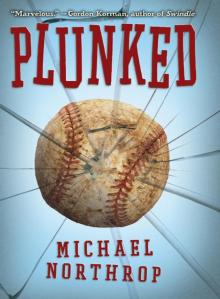 Plunked
Plunked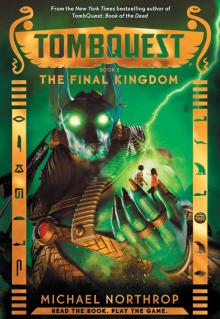 The Final Kingdom
The Final Kingdom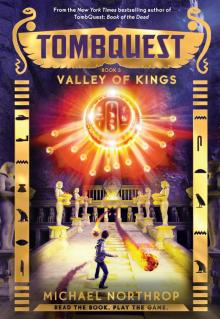 Valley of Kings
Valley of Kings Surrounded by Sharks
Surrounded by Sharks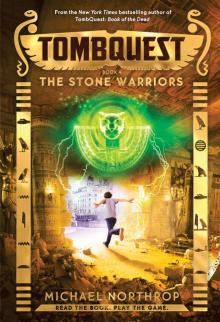 The Stone Warriors
The Stone Warriors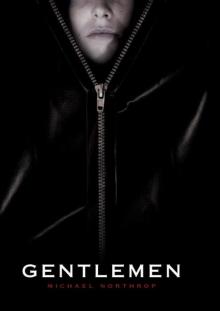 Gentlemen
Gentlemen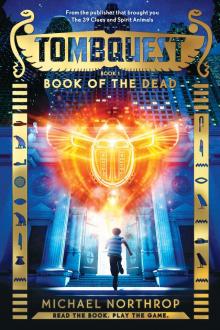 Book of the Dead
Book of the Dead Polaris
Polaris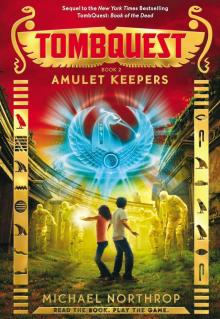 Amulet Keepers
Amulet Keepers